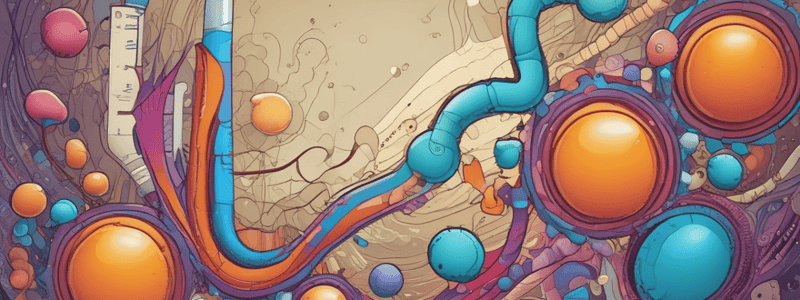Podcast
Questions and Answers
What is the mechanism by which incretins increase insulin secretion?
What is the mechanism by which incretins increase insulin secretion?
- Via the activation of G-protein-coupled receptors (correct)
- Through the activation of calcium-induced endocytosis
- By reducing the levels of cAMP
- Through the inhibition of glucagon secretion
What is the role of the arcuate nucleus of the hypothalamus in regulating glucose metabolism?
What is the role of the arcuate nucleus of the hypothalamus in regulating glucose metabolism?
- To increase glucagon secretion
- To regulate islet hormone secretion
- To sense nutrient availability and relay neural signals to the liver (correct)
- To decrease insulin secretion
How does a lack of insulin affect glucose levels in the blood?
How does a lack of insulin affect glucose levels in the blood?
- Glucose is circulated in the blood, and excess glucose is secreted by the kidneys (correct)
- Glucose is used for lipid metabolism
- Glucose levels decrease in the blood
- Glucose is taken up into cells more efficiently
What is the primary mechanism by which insulin regulates glucose metabolism?
What is the primary mechanism by which insulin regulates glucose metabolism?
What is the primary mechanism by which incretins regulate islet hormone secretion?
What is the primary mechanism by which incretins regulate islet hormone secretion?
What is the result of insulin binding to specific membrane receptors on target cells?
What is the result of insulin binding to specific membrane receptors on target cells?
What is the fate of glucose in the cell after insulin-mediated glucose uptake?
What is the fate of glucose in the cell after insulin-mediated glucose uptake?
What is the effect of insulin on glycogenolysis, lipolysis, and proteolysis?
What is the effect of insulin on glycogenolysis, lipolysis, and proteolysis?
What is the response to insulin binding to specific membrane receptors on target cells in terms of glucose transporters?
What is the response to insulin binding to specific membrane receptors on target cells in terms of glucose transporters?
What is the result of insulin-mediated inhibition of glycogenolysis, lipolysis, and proteolysis?
What is the result of insulin-mediated inhibition of glycogenolysis, lipolysis, and proteolysis?
What is the primary mechanism of insulin release in response to a meal?
What is the primary mechanism of insulin release in response to a meal?
Which of the following would NOT inhibit insulin release?
Which of the following would NOT inhibit insulin release?
What is the primary function of somatostatin in relation to insulin release?
What is the primary function of somatostatin in relation to insulin release?
What is the reason why insulin must be administered parenterally to treat diabetes?
What is the reason why insulin must be administered parenterally to treat diabetes?
What is the primary stimulus for the release of glucagon-like peptides from the digest tract?
What is the primary stimulus for the release of glucagon-like peptides from the digest tract?
Flashcards are hidden until you start studying
Study Notes
Insulin
- Biological duration of action: 2-4 hours
- Facilitates removal of glucose from blood into muscle and fat cells
- Binds to specific membrane receptors on target cells and activates tyrosine kinase enzyme
- Initiates cascades of phosphorylation reactions leading to many kinase and phosphatase activities, as well as DNA transcription and cell replication
- Increases glucose uptake into cells, 'trapping' it as glucose-6-phosphate
- Inhibits glycogenolysis, lipolysis, and proteolysis
Glucagon
- Hormone secreted by alpha cells in the pancreas in response to hypoglycaemia and high-protein meals
- Stimulates hepatic glycogenolysis and gluconeogenesis, lipolysis, and ketogenesis
- Inhibits glycogen synthesis
- Stimulates release of catecholamines, inhibiting tone and motility in GIT smooth muscle
- Increases release of GH, ACTH, and insulin
- Secretion is inhibited by insulin, hyperglycaemia, and incretins
Incretins
- Peptide hormones secreted from the intestinal mucosa into the circulation in the presence of food
- Increase insulin secretion via G-protein-coupled receptor activation, raised cAMP levels, and calcium-induced exocytosis
- Regulate islet hormone secretion, glucose concentrations, lipid metabolism, gut motility, appetite, and body weight
Central Nervous System
- Nutrient availability sensed in the arcuate nucleus of the hypothalamus
- Neural signals relayed via efferent vagal fibres to the liver, inhibiting glucose production
- In T2DM and obesity, the brain incorrectly perceives and responds to peripheral signals of low nutrient availability
Diabetes Mellitus
- Characterized by polyuria associated with a chronic disorder of carbohydrate and lipid metabolism
- Inappropriate rise in glucose level in the blood due to a relative or absolute lack of insulin
- Type 1: complete lack of insulin, believed to be an autoimmune disease
- Type 2: relative lack of insulin or defects of the insulin receptors due to poor diet/lifestyle, obesity, and other factors
Hyperglycaemia
- Lack of insulin means glucose cannot be taken up into cells
- Excess glucose circulated in blood, and excess glucose secreted by the kidneys (glycosuria)
Pancreas
- Exocrine function: contains digestive enzymes, enzyme precursors, and electrolytes, discharged into the gastrointestinal tract
- Endocrine function: produces hormones controlling blood glucose levels and some gastrointestinal functions
- Insulin produced by beta cells, glucagon produced by alpha cells, and somatostatin produced by delta cells
Studying That Suits You
Use AI to generate personalized quizzes and flashcards to suit your learning preferences.




